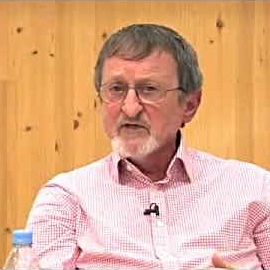Biography
Roger Bromley is an Emeritus Professor of Cultural Studies and Honorary Professor of Sociology at the University of Nottingham. He is also a Visiting Professor in the Centre For Transcultural Writing and Research at the University of Lancaster and an Associate Fellow in politics at Rhodes University, South Africa ( the ‘Thinking Africa’ project).
Currently, he is working on a book called ‘Narratives of Hope? Conflict, Reconciliation and Cultural Forms’ (with reference to Bosnia, Rwanda and South Africa) and is also involved with a project on the representation of migration and displacement, provisionally entitled ‘People on the Move: Narratives of Displacement and Belonging’, a follow-up to his book, ‘Narratives for a New Belonging: Diasporic Cultural Fictions’, published by Edinburgh University Press.
He is a member of the Centre for the Study of Post-Conflict Cultures, and the Identity, Citizenship and Migration Centre (ICMIC)at Nottingham and supervises theses in conflict and post-conflict, migration and refugee issues,transcultural writing and cultural studies.
KEYNOTE TALK
In Between Stories: Gramsci’s ‘morbid symptoms ’and changing narratives in Cultural Studies
‘It’s all a question of story. We are in trouble now because we do not have a good story. We are in between stories. The old story…is no longer effective. Yet we have not learned the new story.’ (Thomas Berry)
It is generally agreed that we live in a time of transition but what we do not know is where this ‘trans’ will take us. At a time of radical change and deep uncertainty (the morbid symptoms of Trump, Brexit, and ISIS), new stories are only half the story. Imagining the future, an alternative future, is also a theoretical and political challenge. Cultural Studies has always been an eclectic field of study and dealt with the complexities of the social, cultural, and the political but it now needs to consider whether, in coming to terms with emerging technologies, the relatively new insights of chaos and complexity theory (contingency, path dependency, and system creativity) can be harnessed to its traditional concepts and methodologies. Mapping the field was a familiar, sometimes tedious, activity of cultural studies but we may now need a new cartography which can take account of the worlds of artificial intelligence, algorithms, platform capitalism, cyber-hacking, climate change and its denial, as well as ‘post’ claims (post-democracy, post-politics, post-humanism). All of these will have to be seen in the context of a reconfigured global politics characterised by the financialization of value/s, the wide-scale displacement of people, new paradigms of war, and the so-called ‘fourth industrial revolution’ and the ‘fifth discontinuity’.
Cultural studies has always been a political project, a counter-narrative of resistance even, to the monoliths of academic disciplines and orthodoxies, going beyond, and breaking down, prevailing binaries. It retains still its continuing preoccupation with class, race, gender, sexuality and environment but now these have taken on fresh transdisciplinary perspectives and new configurations under the pressure of changing hierarchies and asymmetries of power as each of these preoccupations has become more exposed, subject to a contemporary rawness at a time of profound transformation. All of these need to be re-orientated, extended beyond the nation which has long been its focal point, to shift the geopolitics of critical knowledge in order to respond to the specificities and particularities of decolonial thinking among other things. Cultural studies began with the analysis of sign, symbol, and text in the context of social and political phenomena, and it needs to maintain this analytical stance in connection with contemporary geopolitics – the everyday life of increasing inequality and oppression – in its social, economic, material and technological forms. What are the conditions in which interventions (a favourite cultural studies term borrowed from Gramsci) can now take place? Is the field of cultural studies robust enough to carry out ‘the ethical imperative of scholarly participation in the transformation of the social world and its constituting and constitutive intellectual structures’, and does it ‘have the capacity to articulate a “history of the present” to which it can respond in ways that would be at once intellectually and politically productive’?

